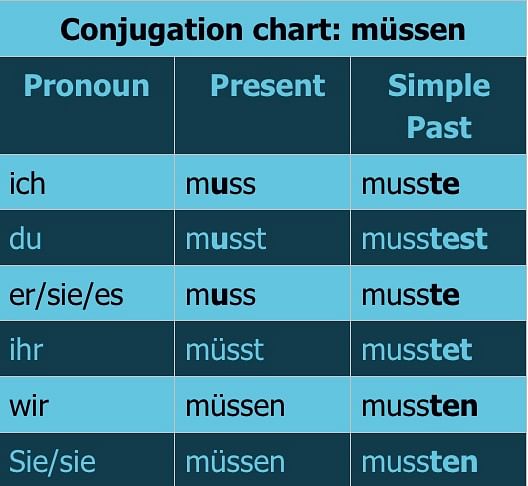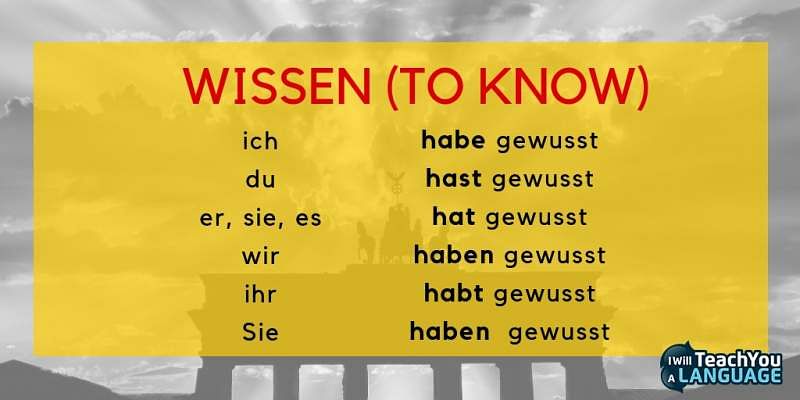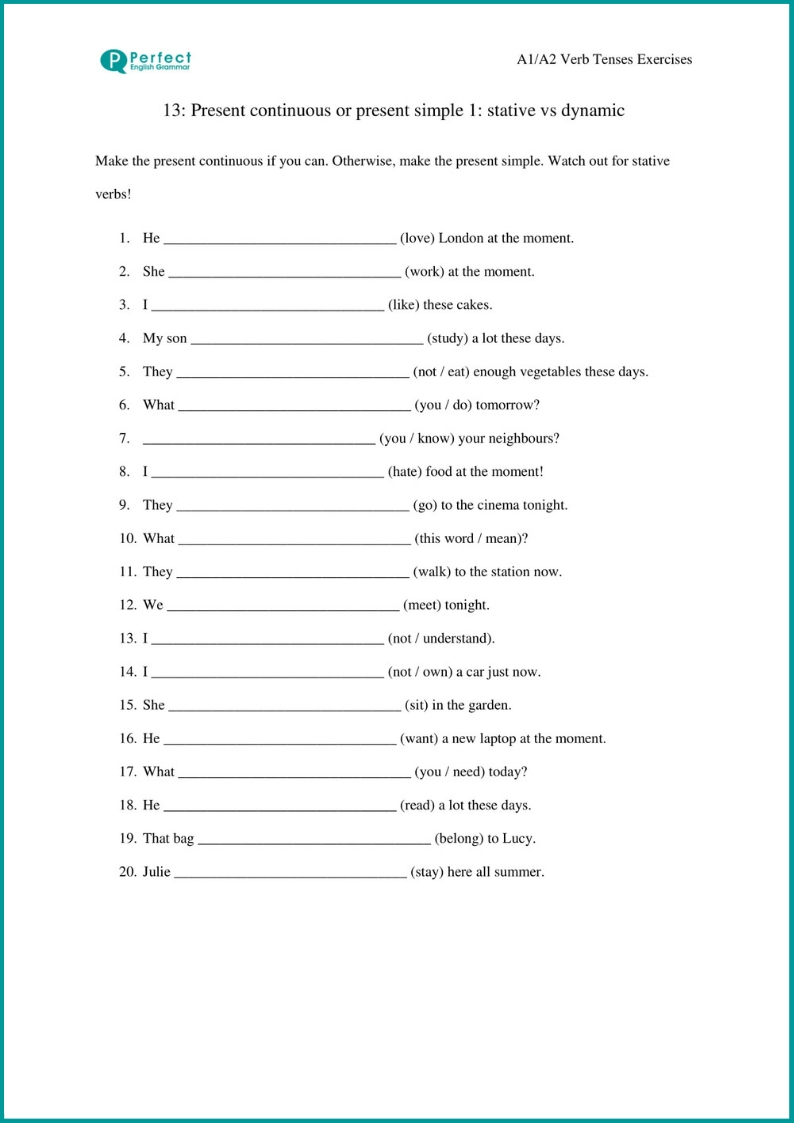This lesson is packed full of yummy foods and fun games. Through these games, you are able to practice verb conjugation in an interactive environment, instead of boring fill-in-the-blank worksheets. With modal verbs and the future tense, it is imperative that you practice the verb conjugation. Review these games over and over to get excellent at conjugating these verbs. Remember that the modal verbs (können, dürfen, mögen, wollen, müssen, sollen, and möchten) are irregular.
They do not have endings in the ich and the er, sie, es forms. Mögen, dürfen, können, wollen, and müssen all have vowel changes. We have not seen this before, so please make sure you printed off the conjugation sheet.
These verbs go into the standard second position of a sentence and the second verb goes to the end of the sentence, remaining in the infinitive form. German has six modal verbs that you should memorize. They express an attitude about an action or condition described by the main verb. The modal auxiliary is conjugated and placed in the second position of the sentence. The main verb is in the infinitive form and placed at the end of the clause or sentence. (I can buy a ticket.)Kann is the conjugated auxiliary verb and kaufen is the main verb in infinitive form.
Besides our modal verbs, we learned werden with the future tense. Like the modal verbs, werden goes into the second position and is conjugated. The second verb goes to the end of the sentence and remains in the infinitive form. Werden is irregular as well with the du and er, sie, es forms changing from a e to an i. The er, sie, es form also ends in a d instead of the standard t ending.
How Many Modal Verbs Are There In German When used with a second verb, that second verb comes at the end of the sentence in the infinitive form, while the modal verb is conjugated in regular verb position. The modal verbs in the imperfect tense all share the same endings, and all of the umlauts disappear. Notice that the umlauts disappear completely in the imperfect tense. Notice also that with the verb mögen, the -g- changes to -ch-. -,gamōtmaymögen, magmogen, magmögen, magmeie, meimagmå(må)mega, mámagum, magwissen, weißweten, weet? Witte, witweetvedvetvita, veitwitum, wait(tharf)dürfen, darfdurven, durfdörven, dörvdoarre, doardurf?
Þaúrbum, þarfThe English could is the preterite form of can; should is the preterite of shall; might is the preterite of may; and must was originally the preterite form of mote. (This is ignoring the use of "may" as a vestige of the subjunctive mood in English.) These verbs have acquired an independent, present tense meaning. The German verb möchten is sometimes taught as a vocabulary word and included in the list of modal verbs, but it is actually the past subjunctive form of mögen. The conjugation of modal verbs in German can sometimes be confusing. The singular forms mostly require a stem change. The ich and er, sie, es forms of the modal verbs do not require an ending.
The plural forms of the modal verbs are conjugated normally. In the image below you will see how to conjugate all of the modal verbs in German along with "werden", which is not a modal verb, but is included within this lesson. When a modal is used with an additional verb in the present perfect tense, a double infinitive construction is used in lieu of the past participle. The perfect tense auxiliary is conjugated to agree with the sentence subject and the infinitive forms of the main verb and modal verb appear together at the end of the sentence. In this section, you will be working only with translations and then take a quiz.
The games were great practice for learning how to conjugate a verb. Now it is time to apply what we have been learning and to work on translating. The most important step to remember with regards to the future tense and using modal verbs, is that the conjugated verb issecondand the infinitive islast. If you remember those two rules, creating these sentences will be much easier. You will be using a second verb with these sentences.
This second verb will remain at the end of a sentence, in the infinitive form. This word order is different from what we do in English, where both verbs remain together. Review the examples below, then play the modal verb conjugation games below.
These will help you practice the various forms of the modal verbs. You can choose which game you would like to play. The future tense is similarly formed using a double infinitive construction when a modal verb is used.
Here, the future tense auxiliary werden is conjugated and the infinitive forms of the main verb and modal verb appear together at the end of the sentence. The modal verbs in German are dürfen (be allowed to/may), können (be able to/can), mögen (to like/may), müssen (to have to/must), sollen (to ought to/should) and wollen . Modal verbs express ability, necessity, obligation, permission or possibility. German modal verbs fall under the category of irregular verbs. Modal verbs are conjugated depending on the subject of the sentence, and take the second position.
The other verb is placed at the end of the sentence in its infinitive form. 1 Conjugation of dürfen in German This page shows the conjugation of the verbs dürfen. The present subjunctive forms are based on the simple past conjugation.
If the verb has an umlaut in its infinitive then it is added back in the present tense subjunctive conjugations. What this means is that the present tense subjunctive form of 4 of the modal verbs with umlauts is created like that of the other mixed verbs. The subjunctive forms of wollen and sollen are created like that of the weak verbs. Modal verbs can also be used with dependent verbs that are not in infinitive form, such as to refer to a past event or with a passive-voice dependent verb. Note in these examples the difference in tense between the modal verb and its dependent verb.
In the following four examples, the modal verbs are all in present tense, but modal verbs can potentially be used in any tense, independent of the tense of the dependent verb. Watch for those tense differences and adapt your understanding of the meaning accordingly. In all cases, you can count on the dependent verb appearing at the end of the clause and in infinitive form, i.e., not conjugated to match a particular subject. To conjugate modal verbs in the present and simple past, we use the finite form of the modal verb. However, to conjugate modal verbs in the perfect tense, we use the infinitive form of the modal verb and full verb and the finite form the auxiliary verb.
The conjugation of modal verbs is irregular in the present tense singular, due to the fact that there are no endings in the first and third person. Pay attention to the vowel change of modal verbs in the plural. In many Germanic languages, the modal verbs may be used in more functions than in English. In German, for instance, modals can occur as non-finite verbs, which means they can be subordinate to other verbs in verb catenae; they need not appear as the clause root. In Swedish, some modal verbs have infinitive forms. This for instance enables catenae containing several modal auxiliaries.
The modal verbs are underlined in the following table. Create the past participle with a form of haben and the infinitive form of können. The main verb will also be in the infinitive form to construct what we call the double infinitive. Place both verbs at the end of the sentence together. In the formation of both the present and past perfect tenses of the modal verbs we are introduced to a variation on the "double infinitive" phenomenon.
Rather than a past participle, you will see the infinitive form of the modal next to the dependent infinitive. Take this quiz after you have practiced the future tense conjugation. Later there in an inclusive quiz that will practice translating sentences using both modal verbs and the future tense. It may not seem logical to introduce the future tense as the same time as modal verbs, however, the sentence structure is identical to model verbs. With the future tense, you will be using the verb werden. This verb has 2 meanings, one is to become and the second is the future tense or will.
What is very important to remember is the verb wollen is a false cognate. Which means that even though will looks like the future or will in English, it in fact means to want! Otherwise, translations will be very difficult for you. The biggest change with modal verbs versus regular verbs, is the verb conjugation.
Modal verbs do not take a verb ending in either the ich or er, sie, es forms. The second change you will notice is that the majority of these verbs have a vowel change. We have not used many verbs yet with vowel changes, so this is very new.
You played secret signal with dürfen, mögen and sollen last week so play it this week with these 3 modal verbs. Sag mir nach the verbs and play secret signal after each one. Using slide 8 (können) as an example, sag mir nach the vocabulary on the slide and then ask one child to leave the room. Agree with the rest of the class on a secret signal, such as touching your nose. Choose a child to perform this signal at any given moment. Bring the first child back into the room and ask the class to say 'ich kann' in a chant.
Every time the class sees the designated person do the agreed secret signal, they move onto the next phrase in the list - du darfst. The child has to guess who is doing the signal before the class gets to the bottom of the list. If the child who went outside guesses correctly, they earn a reward. If the class get to the bottom, the 'signaller' and somebody else from the class, earn a reward. In German as well as in the English language, there are a group of verbs named modal verbs or modal auxiliaries. Modal verbs give more information about the main verb in a sentence.
They describe the main verb in a range of possibility to necessity . Therefore, the content of the sentence changes, if you are switching the modal verbs.There are six modal auxiliaries in the German language. It is also worth mentioning that modal verbs can also be used in the simple past tense, but unlike in the perfect, they need to be conjugated.
There is one main tip to remember here, and that is that there are never any umlauts in the simple past forms of modal verbs. In German, modal verbs are very similar to those in English; as they are generally used together with a main verb in its infinitive form. However, there is one main difference between both languages. In English, the modal verb and the main verb stay together; whereas in German, the modal verb and the main verb are separated; as the main verb goes to the end of the sentence.
These verbs behave much like an auxiliary verb in that they are typically used in combination with other verbs. The modal verb is conjugated to agree with the subject of the sentence. The other verb is at the end of the sentence in its infinitive form. The modal verbs are conjugated in regular verb position, and the second verb comes at the end of the sentence in the infinitive form.
The following table shows the conjugation of modal verbs in the present and simple past tenses as well as the verb conjugation for the past participle and subjunctive II. Werden, like the modal verbs does not have regular verb conjugation. Both the du and the er, sie, es forms have a vowel change.
It is best to memorize this verb, there is really no special trick to remembering it. Modal verbs are a special group of verbs that act a little different than regular German verbs. These verbs will be used in conjunction with another verb. This second verb will be left in the infinitive form and will go to the end of the sentence. The modal verb will follow traditional German verb rules.
It will be conjugated and placed in the standard second position. It is important to learn these verbs together as a group, since they follow the same basic rules and patterns. Auxiliary use - You can only use modal verbs as auxiliary verbs, in order to modify the meaning of the main verb. You will usually use modal verbs together with another verb in the German language. Usually, the modal verb will come first, in its conjugated form. Then, due to the rules of German word order, the second verb will come at the end of the sentence or phrase in the infinitive form.
Modal verbs are used to express the speaker's attitude about what they are saying, or to show how certain information is known. These verbs are also called "helping verbs" because they help the main verb by adding additional meaning. One way in which modal verbs differ from other types of verbs is that they can be used with a passive construction.
But there are some nuances to the German passive voice that you may not have been aware of previously. In both English and German, modal verbs are used to express necessity or possibility. In English, these verbs are "must," "should," "shall," "will," etc.
In German, these verbs are "können," "mögen," "dürfen," "müssen," "sollen," and "wollen." Amodal verbis a type of auxiliary verb that "modifies" or gives more information about the function of the main verb that follows. In a sentence, the modal verb has to be followed by a verb in its infinitive form – most times, the sentence wouldn't make sense without the main verb. All of the other verb tenses are compound tenses, i.e. they employ a helping verb in addition to the modal verb. In these tenses, a helping verb is the finite verb in the 2nd position in the sentence and the modal verb is relegated to a place at or near the end of the sentence. In the perfect tenses, the helping verb for all modal verbs is haben.

























No comments:
Post a Comment
Note: Only a member of this blog may post a comment.